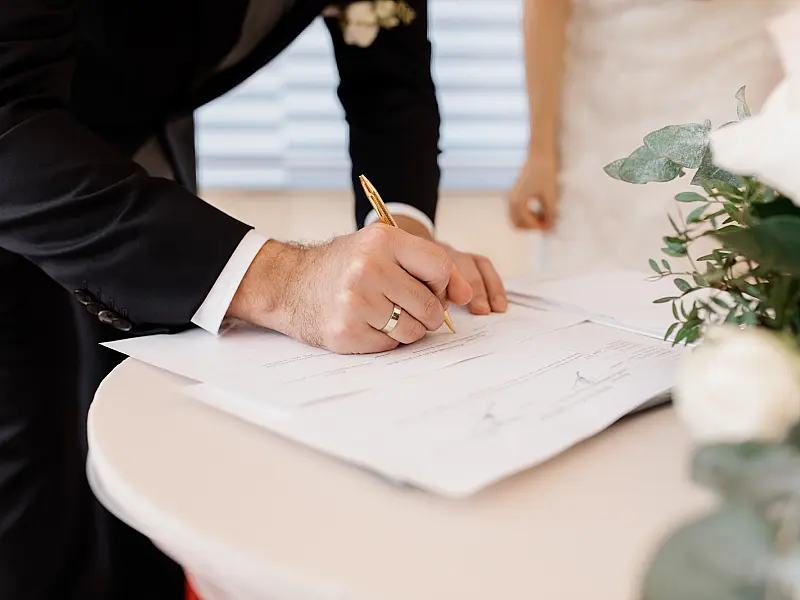Table of Contents
In Nepal, the registration of marriage at the ward office acts as the official legal acknowledgment of a marriage, irrespective of the manner in which the marriage was performed whether through religious practices, cultural rituals, or a court procedure. This registration is crucial as it converts a personal or cultural union into a partnership that is legally acknowledged by the law.
The Local Government Operation Act, 2074 and the National Civil Code, 2074 regulate legal aspects of marriage in Nepal. According to these laws, the ward office, the local government administrative unit has the power to register marriages. Registering a marriage provides the couple with an official marriage certificate, which is essential for numerous reasons, including,
- Official evidence of marriage for citizenship, immigration, and visa applications.
- Inheritance rights refer to the entitlements of a legally recognized spouse to property and assets.
- Collaborative ventures, like establishing a shared bank account or requesting loans.
- Safeguarding marital rights, such as spousal support, child custody, and alimony during separation or divorce.
No matter if a marriage took place via Hindu rites, Buddhist customs, Christian traditions, or a court ceremony, it must be registered at the ward office for legal recognition. This promotes consistency in the acknowledgment of marriages and supports the rights and duties of partners according to Nepalese law.
Registering a marriage at the ward office is the essential legal procedure that formalizes a couple’s partnership in Nepal, granting them legal recognition, rights, and protections according to the law.
Eligibility Criteria For Marriage Registration in Ward
The eligibility criteria to marry is set by the law and it is written in National Civil Code, 2074.
Minimum Age Criteria
Article 70(1), National Civil Code, 2074
In Nepal, for a marriage to be legally registered, both parties, the man and the woman, must be at least 20 years old.
As stated in Section 70(1) of the National Civil Code, “A marriage shall not be established between a man and a woman unless both parties are at least twenty years old and give their mutual consent.” This clause guarantees that both parties possess the maturity to comprehend the obligations and consequences of marriage. Marriages performed before attaining this age, even with parental approval, are deemed child marriages and are not legally recognized. Additionally, child marriage is penalized by Nepalese law, highlighting the government's dedication to safeguarding youth from early and potentially detrimental relationships.
Mental Competence and Voluntary Agreement
Article 69, National Civil Code, 2074
“A marriage is not valid unless both the man and woman mutually accept one another as husband and wife with free consent.”
This clause emphasizes that consent must be provided willingly, free from pressure, excessive influence, or intimidation. Both parties need to be mentally competent, able to grasp the essence of the marriage agreement and the responsibilities it entails. If one party is mentally incompetent or unable to give informed consent at the time of the marriage, the marriage may be deemed void or voidable based on the situation. This protects the rights of at risk individuals and maintains the idea that marriage is a consensual union.
Prohibition of Bigamy
Article 175, National Civil Code, 2074
“During the existence of a marital relationship, no individual shall marry someone else or form another marital bond.”
Nepalese law upholds the concept of monogamy, indicating that a person cannot be lawfully married to multiple partners simultaneously. This indicates that an individual must be either single, officially divorced, or a widow at the moment of marriage registration. Entering into a second marriage while the first remains legally intact is considered bigamy, a criminal act subject to legal penalties. This legal protection guarantees equity, clarity, and safeguarding of the rights of everyone participating in a marriage.
No Forbidden Blood Relationships
Section 71, National Civil Code, 2074
"A marriage shall not be valid between a man and a woman if they are kin in a manner that is forbidden by law or tradition."
Nepalese law explicitly forbids marriage among individuals connected by close blood relations, as outlined in Section 71 of the Civil Code. This encompasses connections like siblings, parents and offspring, as well as uncle-niece or aunt-nephew. The objective is to avoid interrelated marriages that could present genetic dangers and breach social or cultural standards. The law considers both legal restrictions and traditional laws, which can differ among the various ethnic communities in Nepal. A marriage that contravenes these kinship restrictions is deemed invalid from the outset, lacking any legal recognition or consequences.
Each of these eligibility criteria is essential for guaranteeing that marriages in Nepal are established with legality, dignity, and consideration for personal and societal standards. Adherence to these standards is essential prior to registering a marriage at the ward office, thereby legitimizing the union according to Nepalese law.
Step by step Process for Marriage Registration in Ward, Nepal
Selecting the Right Ward Office
The initial step in registering a marriage in Nepal is to locate the appropriate ward office where the application needs to be filed. Legally, the union can be registered at the local office of either the bride's or the groom's official residence, as indicated on their citizenship documents. If the bride and groom live in separate wards or municipalities, they can select either ward office for registration, based on their convenience. This stipulation provides adaptability and ease of access for couples, particularly in situations where one partner might have moved or settled elsewhere following marriage. Selecting the correct ward office early is crucial, as this office will handle the marriage verification and provide the certificate.
Acquiring and Completing the Form
After selecting the suitable ward office, the couple needs to obtain the marriage registration form from there. This document is the official request needed to initiate the registration procedure. It includes spaces for the complete names of both individuals, the names of their parents, birth dates, citizenship IDs, and both permanent and temporary residences. Moreover, the couple needs to indicate the date and location of the marriage ceremony, whether it took place at a temple, a religious venue, their home, or in a courtroom. Precision is important when completing this form, as any discrepancies may result in holdups or denial. In certain municipalities, the form might be accessible online for downloading or digital completion, although submission.
Gathering Necessary Documents
Supporting documents are crucial for the marriage registration procedure, as they confirm the identity and legality of the union. The bride and groom are required to submit copies of their citizenship certificates, which act as evidence of their age, identity, and nationality. Two copies of passport-size photographs are needed to be attached to the form. Evidence that the marriage took place must also be submitted, this can consist of pictures from the ceremony, a wedding invitation, or a letter of endorsement from a religious officiant. Furthermore, the citizenship certificates of no less than two adult witnesses who attended the wedding must be provided as certain jurisdictions demand three witnesses. The husband’s population card is frequently required, and if the couple is registering their marriage in a ward outside of their hometown, a migration certificate (basai sarai) is also needed. These documents assist in confirming that all legal requirements are satisfied and that the marriage adheres to Nepalese civil law.
Sending the Application and Documents
Once the form is filled out and the necessary documents are collected, the couple needs to personally deliver the application to the ward office. Witnesses must be physically present with their original citizenship certificates during the submission process. They will complete the registration form to confirm their presence at the marriage ceremony and can verify its legitimacy. This face-to-face procedure enables the ward officials to confirm the identities of everyone involved and to request clarifications, if needed.
Validation and Assessment
After the application is submitted, the ward office carries out a verification procedure. This involves verifying the correctness and uniformity of the details given on the form, authenticating all provided documents, and confirming that the marriage meets the eligibility requirements specified in the National Civil Code, 2074. If any aspect of the application raises concerns like inconsistent data, unverified witness identification, or dubious marriage evidence the couple might need to clarify or supply additional documents. This evaluation procedure is crucial to thwart fraudulent sign-ups and uphold the legal integrity of the registration system.
Fees Payment
After verification, the couple must pay a registration fee, which is generally low. While the cost may differ depending on the municipality, it typically falls around NPR 500. This payment can be processed at the revenue desk of the ward office, and a receipt will be provided to the couple. The receipt acts as confirmation of payment and ought to be kept for future use, particularly in the event of delays or problems with certificate issuance. In certain situations, extra charges might be incurred for fast-tracked services or the replacement of lost certificates.
Marriage Certificate Issuance
After all formal procedures are finished, the ward office will provide the official marriage certificate. This certificate acts as official evidence of marriage and is acknowledged for all administrative, legal, and personal needs including immigration, banking, property rights, inheritance, and child registration. Generally, the certificate is granted within 15 business days from the application date, but this timeframe may change based on the local office's efficiency. The certificate contains information like the names of the partners, their citizenship numbers, the wedding date, and the names of the witnesses. Once provided, this document certifies that the marriage is fully recognized under Nepali law.
Important Remarks
Court Marriage
When a couple intends to hold a court marriage, the procedure varies somewhat. It starts with a petition to the district court, which requests a recommendation letter from the ward office verifying that both parties are unmarried. Upon verification, the court performs the marriage and provides a certificate, which can subsequently be registered at the ward office for documentation purposes.
Marriage with Foreign Nationals
When one partner is a foreign national, more documentation is necessary. This comprises a No Objection Certificate (NOC) from the foreigner's embassy, evidence of legal residence in Nepal (like a visa or residence permit), and translated and notarized versions of foreign documents if they are not in Nepali or English. These criteria exist to confirm that the foreign national can legally marry according to both Nepali laws and those of their home country.
Online Registration
While complete online marriage registration isn't presently accessible in Nepal, certain urban municipalities might provide the ability to download or pre-fill the form online. Nonetheless, the couple and witnesses must be physically present at the ward office for verification and to complete the process. It is recommended to get in touch with the local ward office beforehand to verify if any portion of the procedure can be started online.
This detailed procedure guarantees that a marriage is formally recorded and acknowledged by Nepali law, protecting the rights of both partners and allowing access to numerous legal and administrative advantages.
| STEP | REQUIRED DOCUMENTS |
|---|---|
| Choose Ward Office | Where either bride or groom resides |
| Application Form | Obtain and fill at the ward office |
| Citizenship Certificates | Both parties and witnesses |
| Marriage Evidence | Photos, marriage card, or other proof |
| Passport Photos | Usually, 4 per person |
| Witnesses | 2, with citizenship certificates |
| Population Card | Of husband (if available) |
| Migration Certificate | If registering outside native residence |
| Fee | Around NPR 500 (may vary) |
| Certificate Issuance | Within 15 days if all documents are correct |
Conclusion
Registering a marriage at the ward office in Nepal is an essential legal procedure to legitimize a union according to Nepali law. Though the procedure is fairly simple, it demands meticulous attention to detail particularly in organizing the required documents and confirming the availability of legitimate witnesses. Fulfilling these requirements accurately aids in preventing delays or issues. After verification, the ward office provides an official marriage certificate, which acts as the legal evidence of marriage and is acknowledged by all governmental and legal entities throughout Nepal. This certificate is crucial for obtaining spousal rights, enrolling children, applying for shared property, or starting immigration procedures.


-thumb.webp)


-thumb.webp)
